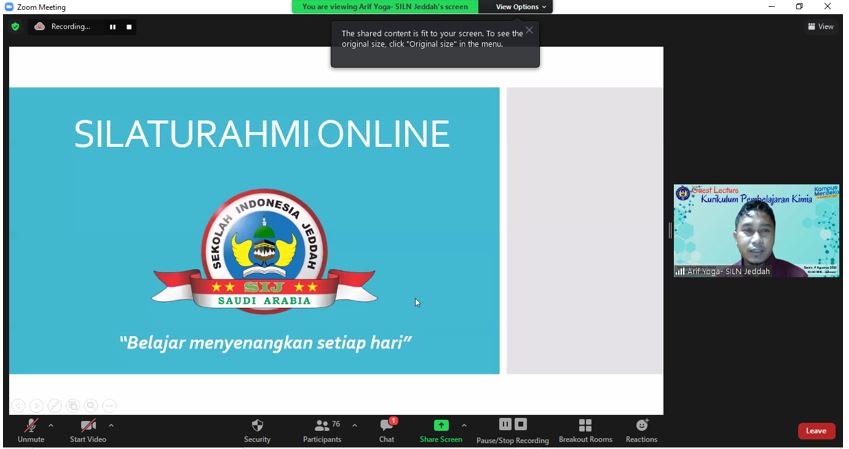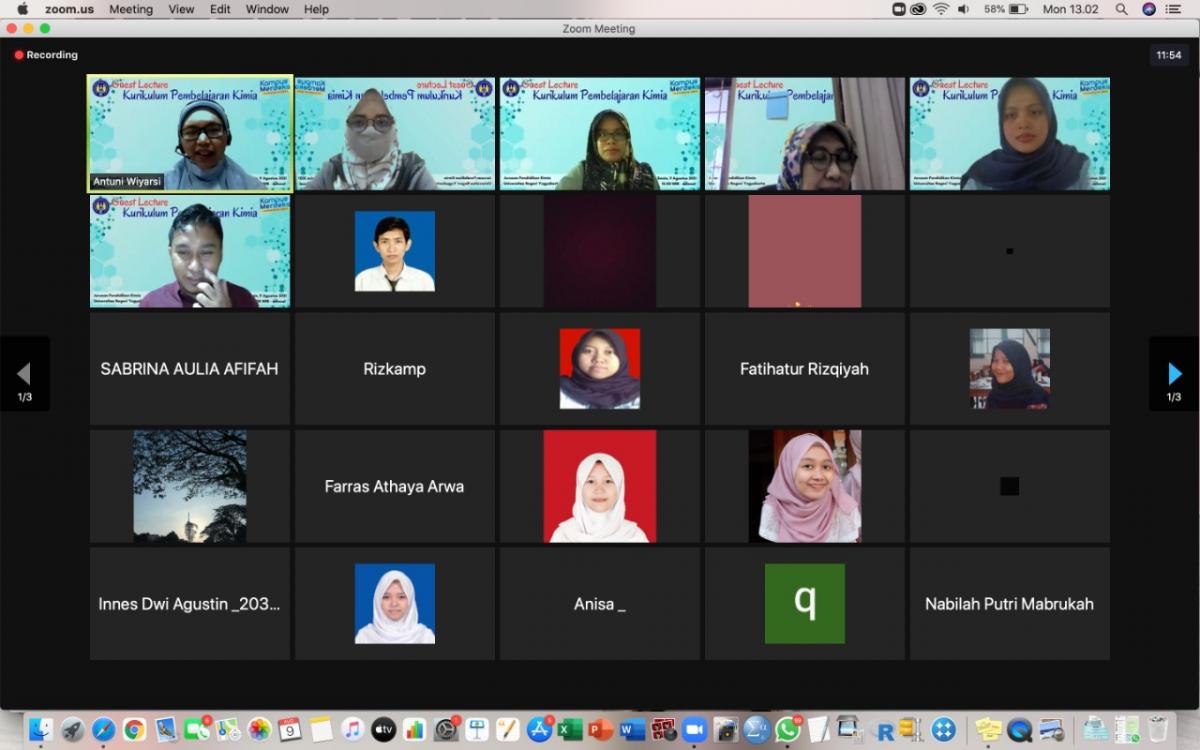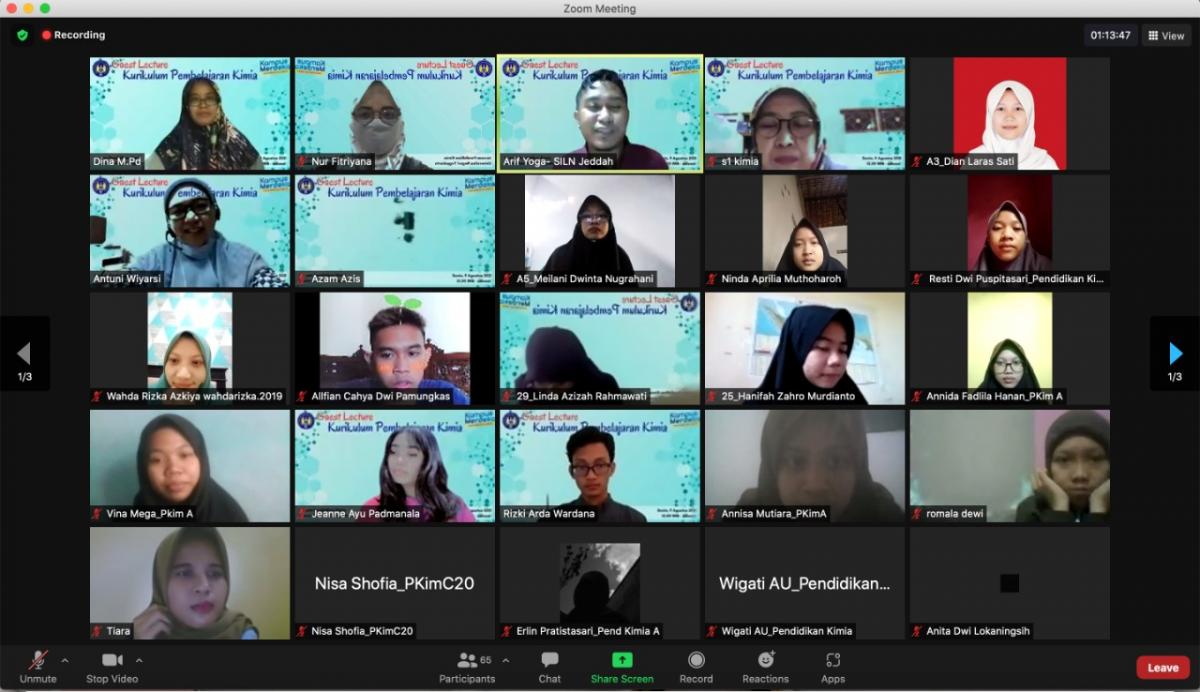 Bahasa Indonesia
Bahasa Indonesia English
English
You are here
Guest Lecturer for Overseas Indonesian School: Jeddah Saudi Arabia - Arif Yoga Pratama, S.Pd

In accordance with the Law of the Republic of Indonesia number 14 of 2005, teachers implement a national education system to realize the goals of national education so as to be able to develop the potential of students responsibly. To prepare prospective teachers who are broad-minded and competent, the Chemistry Education Study Program, Faculty of Mathematics and Natural Sciences, UNY, and the Indonesian School of Jeddah, Saudi Arabia, collaborated through the Chemistry Learning Curriculum Guest Lecture on Monday, August 09, 2021. This activity was attended by all students of the chemistry education study program, accompanied by Head of the Department of Chemistry Education, Faculty of Mathematics and Natural Sciences, UNY, Dr. Retno Arianingrum and Coordinator of Chemistry Education Study Program Dr. Antuni Wiyarsi, M.Sc.
On this occasion, the invited resource person was Arif Yoga Pramata, S.Pd.Gr, a graduate of the 2010 Chemistry Education Study Program. The interesting things he conveyed were about the education system, curriculum, teaching and learning activities, and evaluation system.
- The Indonesian School of Jedah (SIJ) consists of 3 levels in one location with the same system as Indonesia for preliminary school for 6 years, junior high school for 3 years, and senior high school for 3 years.
- Students at the School of Indonesia - Jeddah are Indonesian citizens, while if they are foreign nationals, one of their parents must have an identity as an Indonesian citizen. As part of the Ministry of Education, Culture, Research, and Technology of the Republic of Indonesia, the applicable curriculum at SILN is the same, namely the 2013 Curriculum, even the national exams are held on the same date as Indonesia.
- During the pandemic, teaching and learning activities are carried out online by formulating chemical materials into essential and non-essential material categories. Essential material means material that must be given to students after the syllabus, while non-essential material is material that is considered to be learned in the future. For example, the hydrocarbons studied in class XI and XII. The density of the material studied by students in class XI allows hydrocarbon material to be taught later in class XII.
- As for practicum activities, the chemicals provided in the laboratory are safe and limited materials to minimize the misuse of chemicals that are explosive. However, during the pandemic, learning activities are carried out through Google classrooms and WhatsApp groups, while for practicums using a virtual laboratory.
Several things attracted students' attention to discussion activities, such as careers, holidays, and teacher welfare. Unlike Indonesia, the school holiday in Saudi Arabia is Friday. For prospective teacher students who are interested in becoming teachers at SILN, they must take the Civil Servant pathway test with a maximum period of 3 years working abroad and then have to return to teaching in Indonesia. In addition, the non-civil servant path can be taken with a contract system, namely PPPK ASN. Especially for PPPK, evaluation is conducted every two years based on teachers’ contribution and performance. The active participation of students in guest lecturer activities is expected to provide insight into the implementation of the chemistry curriculum and chemistry learning abroad and prepare themselves to become prospective teachers who are ready to compete globally.


Sistem Informasi
Kontak Kami
Program Studi Pendidikan Kimia
FMIPA Universitas Negeri Yogyakarta
Gedung Dekanat D.07 FMIPA UNY
Kampus Karangmalang Yogyakarta 55281
Telp. (0274)586168 Pes. 115
Email: pend_kimia@uny.ac.id
Copyright © 2024,
